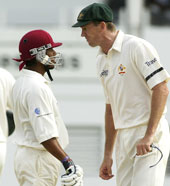Home > Cricket > Columns > Daniel Laidlaw
Why the Aussies can't not sledge
May 23, 2003
The periodic debate over the behaviour of the Australian team has flared again in the past week following Glenn McGrath's ugly outburst against Ramnaresh Sarwan in the fourth Australia-West Indies Test.
 "Australians are not liked around the world," ICC president Malcolm Gray claimed on Wednesday in addressing the fallout from the latest of many incidents to plague Australia over recent years. "Cricket is one of the few sports it [sledging] constantly happens in," Gray told the Australian Associated Press. "In cricket, particularly the Australian team, it seems to have got worse."
"Australians are not liked around the world," ICC president Malcolm Gray claimed on Wednesday in addressing the fallout from the latest of many incidents to plague Australia over recent years. "Cricket is one of the few sports it [sledging] constantly happens in," Gray told the Australian Associated Press. "In cricket, particularly the Australian team, it seems to have got worse."
Speaking on the same day, ICC chief executive Malcolm Speed also expressed concern over Australia's behaviour, while saying the umpires had failed to uphold their responsibility under the new disciplinary code by not laying charges. "This Australia team is one of the greatest teams we've seen in cricket," Speed was quoted as saying by Wisden CricInfo. "It would be a shame if it was remembered as a badly behaved team."
While noting that umpires and referees were also responsible for improving player behaviour, Gray was in no doubt where the longer term solution lay. "It really is up to the national bodies to develop within their teams a change in culture," he said.
This is the crux of the matter. While the ever-inconsistent panel of umpires and referees could be doing more to punish poor behaviour, the Australian Cricket Board will never seriously address it until its cultural origins are understood.
The ACB -- which one suspects is more concerned with the image of Australian cricket rather than unsportsmanlike behaviour per se -- is aware of its responsibilities, at least superficially. CEO James Sutherland called Steve Waugh during the fourth Test to voice his displeasure. But if Sutherland or anyone else thinks a phone call is going to change a culture that produces sledging on cricket fields, they are kidding themselves.
It was John Arlott who contended that cricket, and cricketers, are a reflection of the society in which they live. And while the behaviour of their national cricket team, including its perceived poor sportsmanship when opponents show some resistance, is generally met with varying degrees of disapproval by Australians, its roots are not without cultural influence.
For non-Australian cricket fans, it appears that Australia's behaviour is regarded as puzzling at best, offensive at worst. While it's unlikely to affect how they are rated years from now, it undoubtedly tarnishes their current global image. So why do the Australians sledge? How does it start, and where does it come from? To understand it, it might help to appreciate both the prevailing culture of the Australian cricket team and Australian society in general.
Sledging -- or mental disintegration, gamesmanship, whatever -- is a difficult topic to even approach because it tends to be viewed in fundamentally different terms by different cultures. What Asian cricketers and commentators may find offensive and unacceptable, Antipodean or Caribbean ones may see as mindless and part of the game, and vice-versa. The global nature of cricket means this divergence is unavoidable, and the wide range of views, not to mention inconsistent or biased interpretation of the laws by officials, is one of the reasons it is so controversial.
There are probably two key points to be noted in identifying cultural reasons for Australian sledging. One is that Australia is an informal, egalitarian society. Whereas in the United States coaches are known by their titles, in Australian sport it is not uncommon to hear players refer to them by their nicknames. Ditto captains. Verbal interaction of any kind -- generally speaking, of course -- is quite informal, and authority is viewed with scepticism.
The second key point is that cursing is commonplace, particularly among young people, and is not considered offensive unless actually intended maliciously. Ally these points to an intensely competitive sporting system, and it is conceivable that the Australian cricket team could be viewed as a product of its society.
Still, it's probably more instructive to consider the culture of the Australian team itself. The notion most commonly advanced when Australia's behaviour is discussed is that they do not need to sledge. If Australia is such a formidable team, then sledging should be unnecessary, the argument goes.
What this overlooks is that sledging is not something Australia really engages in as a tactic, but is more of a by-product of their aggressive and confrontational approach to the game. For the most part, the competitive spirit with which the Australians play manifests itself in positive and universally acceptable ways -- fast scoring, mental toughness, teamwork, etc. In the case of sledging, however, it does not.
 While behaviour can always be modified and improved, entirely eradicating scenes like McGrath's explosion is unlikely, because Australia will always tread close to the line of acceptable conduct. Changing this approach would be like telling Gilchrist to bat conservatively or Lee to bowl medium pace. It is against the nature of the team.
While behaviour can always be modified and improved, entirely eradicating scenes like McGrath's explosion is unlikely, because Australia will always tread close to the line of acceptable conduct. Changing this approach would be like telling Gilchrist to bat conservatively or Lee to bowl medium pace. It is against the nature of the team.
In addition to sledging, it should be recognised that cricket's place in the sporting and social landscape is viewed in fundamentally different terms by different countries as well. Australia approaches its cricket like a contact sport, like one of the winter football codes -- frustrations can't be vented physically, so they are done verbally.
This contrasts sharply to the often-heard foreign notion of cricket as a "gentleman's game", which to a lot of Australians has always seemed like an English-perpetuated myth. From the earliest days of betting and match-fixing in village cricket to gamesmanship by W G Grace, through bodyline and chucking, misconduct has been around as long as cricket has existed. In truth, cricket's self-image as a gentleman's game has never really matched its reality.
If they ever did believe it, Australian cricketers were probably disabused of any notion of cricket as the game of gentlemen by W G Grace in 1882, when the good doctor reportedly ran out one of their batsmen after calling him over for a chat, as recently mentioned in the Sydney Morning Herald. Some might say the sporting ideals espoused by England have not been trusted by Australians since.
Of course, this is not to say that Australia is without notions of tradition and sportsmanship on the cricket field. Far from it. It is just that the ethos they have developed is their own, one not necessarily recognised by other teams, which includes tenets such as selflessness, self-effacement, toughness and commitment. Those who don't embrace these principles tend to get weeded out, and opponents who embody the opposite -- viewed as selfish, soft or arrogant -- invariably become targets of derision.
Paradoxically, you might think, Ramnaresh Sarwan is not one of those. Despite appearances, Sarwan is reportedly respected by the Australians for his toughness, as evidenced by the handshakes he received after reaching his Test hundred. Bizarre as it might seem, Sarwan would have won the Australians' admiration for his courage under fire.
The ICC and opponents probably appreciate little of this, the Australians instead appearing to be inexplicably boorish aggressors. They may not be liked, but they are not likely to change.
More Columns of Daniel Laidlaw